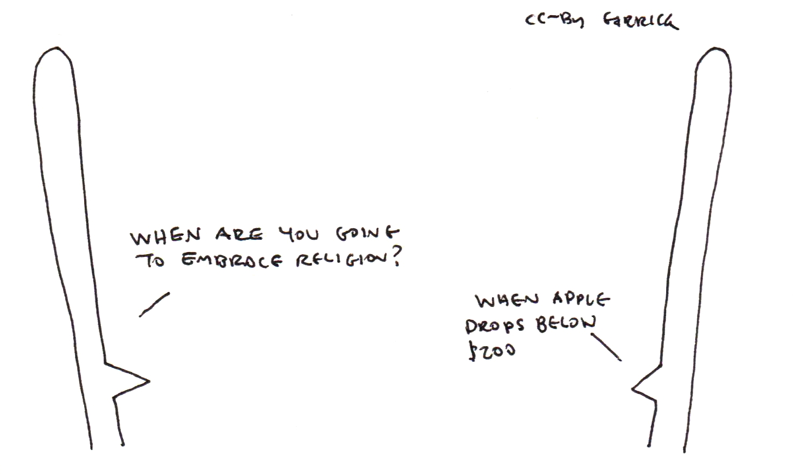Apple releasing iOS7, Mavericks, iLife, and iWork means Apple (still) doesn’t see the value in software. This shift means Apple’s execs are betting in more consumers upgrading higher-margin Apple-made hardware more frequently. Historically, Apple hardware has a 2x lifespan (3-5 yrs) compared against other hardware (Dell, HP come to mind immediately). Have Apple’s recent hardware …
Category Archives: Apple
Apple Ressurects AT&T’s “You Will” Ad Campaign
“In what should be a warm, humanizing montage, people are constantly directing their attention away from one another and the real, panoramic world to soak in pixels. They’re choosing the experience of their products over the experience of other people several times in quick succession. And Apple has a warm voice in the background, goading …
Continue reading “Apple Ressurects AT&T’s “You Will” Ad Campaign”
better than I can skeu it
“But when skeuomorphs get in the way of how we actually use something or build something, they demonstrate a lack of imagination or even cowardice on the part of the designer.…Yes, it’s far easier to get understanding or buy in quickly (from investors, in-laws and users) when you take the shortcut of making your digital …
Catching Up
Reuters 27 January 2013: “‘IPhones are like Louis Vuitton handbags,’ said marketing manager Narisara Konglua in Bangkok, who uses a Galaxy SIII. ‘It’s become so commonplace to see people with iPads and iPhones so you lose your cool edge having one.” – Jeremy Wagstaff Me 6 months ago (1 June 2012):
When Not If
The iPad Mini is about Killing the iPod Touch
The iPod touch has always been Apple’s odd model out. More than an iPod yet significantly less than than an iPhone. Three years ago, I bought an iPod touch because I wanted the iOS experience without being tied to AT&T. These days the iPhone is available on multiple carriers and the iPod touch finally has …
Continue reading “The iPad Mini is about Killing the iPod Touch”
Rations
“Unless you earn a living as an iOS/Mac developer, you may own one Apple device per person.. period. Upgrade every five years.” Damn straight. On a related note – I haven’t applied any of Apple’s updates to any of the MacBooks in the house for at least the last 6 months, likely longer. This increased …
Rejected on Grounds of Perceived Uselesness
“Yes, that’s right, we were rejected on the grounds that unVerse is “not very useful”. Hmm. Strangely, an app that plays a sound of an airplane appears to have more use than our generative music system. Anyway.” – Yann Seznec From an essay I wrote in 1999: “Generative music allows the musician to compose like …
Continue reading “Rejected on Grounds of Perceived Uselesness”
Apple is no longer a premium brand
For decades, Apple was perceived a premium brand with premium products. Products that just worked – with price tags fanatics aspired to. Ironically, Apple’s most successful products – the iPhone and iPad – have completely removed the brand cache. At a glance – I can tell if a laptop is the latest MacBook Air. There’s …
The Second Falling
“The screen’s gotten better, but when’s the last time you saw an iPhone app do something that made you go, ‘Whoa! I didn’t know that was possible!?’” – Alexis Madrigal “Apple’s momentum will carry it for 24-48 months. But without the arrival of a new charismatic leader it will move from being a great company …
